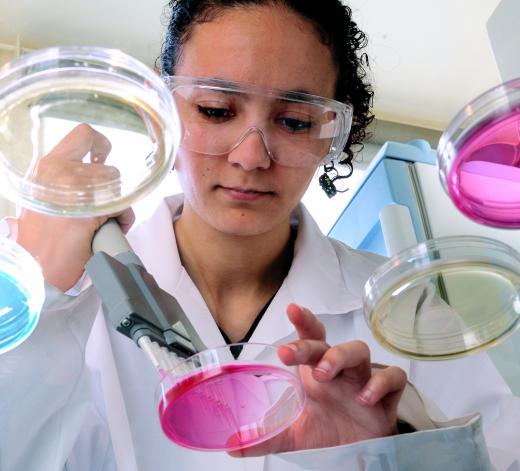What are Some Benefits of Cloning?
Cloning. The word conjures up science-fiction images of huge laboratories filled with human-sized tanks and mysterious equipment. When discussing some of the benefits of cloning, however, the reality tends to be much less dramatic. There are many different areas of cloning, all of which have different potential benefits. A few of them are include natural cloning, called asexual reproduction; the cloning of plants, called vegetative propagation; reproductive cloning of animals; reproductive cloning of humans; and organ cloning.
Some living organisms in nature can duplicate themselves without the need of a partner. Unless they have been mutated by an outside source, the offspring are usually genetically identical to the parent organism. This is called asexual reproduction, and is a type of cloning. This type of cloning is possible in bacteria, fungi, plants, some invertebrates, and rarely in higher-order animals. The benefit of cloning in this way for the organism is that a single individual can repopulate an entire ecosystem. If there was only one human left on earth, that person could not repopulate the world with others of its kind; a single bacterium, however, could.

Gardeners and horticulturists have known the benefits of cloning for years. They use cloning in a process called vegetative propagation. Also known as plant cutting, a section of a living plant is cut away. This section is then placed in a medium like soil or water, and often treated with hormones. In many cases, roots will then grow from the cutting, and a viable, genetically identical new plant is the result. Some benefits of cloning in this way are that especially resistant plant lines can be reproduced for use in diseased areas, individual plants can be shared between gardeners, and reproducing plants that have an offensive sex can be avoided.

The reproductive cloning of animals occurs when an egg without a nucleus is successfully combined with a cell from a donor. This sort of cloning has already occurred, but is not expected to have a high rate of success for many years. Some benefits of cloning in this way are that extinct and near-extinct species could be reproduced for zoos and/or reintroduction into the wild; highly prized domesticated animals could be duplicated to improve food yields in the dairy, beef, pork, and poultry industries; a new pet with a similar genetic potential to a loved one that is lost could be created; and winning race animals could be cloned for competition.

Reproductive cloning is also theoretically possible in humans. The benefits of cloning humans, however, can change with the moral stance of the people discussing the subject. Using reproductive cloning, a couple unable to conceive children could have cloned eggs of each-other implanted into the female. The clones would have the potential to be born just like normal children, and could be raised just as normal children are.

In a slightly different scenario, a wife whose husband has recently died could have his DNA placed into one of her nucleated eggs and have a child with his same genetic potential. In an extremely science-fiction twist, the process of reproductive cloning could be used with the DNA of important historical figures like brilliant scientists and famous world leaders. The resulting children would have the same genetic potential as the famous people they were cloned from, but would not have the same memories, experiences, or upbringing.

Organ cloning is a type of cloning that does not currently exist but is theoretically possible. With organ cloning, human organs could be grown from a small sample of cells for a specific patient. Organ cloning has many potential benefits: cloned organs would not have the potential to be rejected by their recipients like donated organs currently do; cloned organs would be more available than donated organs; and cloned organs could be improved through DNA manipulation to fix defects.
While this has been a long list regarding the benefits of cloning, it is not exhaustive. Other types of cloning and possible benefits include molecular cloning, expression cloning, and cell line cloning.
AS FEATURED ON:
AS FEATURED ON:
















Discussion Comments
The 13th Amendment protects clones.
In reply to Anonymous replies 83256 and 123067 I will tell about a little known court judgment regarding cloned cells.
A man was in for surgery to remove his cancerous cells. These cells were subsequently made available to a research laboratory that made clones of his cells and used them to further cancer research in many research laboratories around the world at a substantial profit to themselves.
The man whose cells they had used sued them for damages and won a court settlement against the lab that had used his cells.
So the court precedent has been set and guess what? You own the cloned cells of your body and are able to use and profit from them as you see fit.
So the precedent to use your clone for organs has already been decided in a case involving a few cancer cells.
As to the clones having rights. They have no rights over the owner of the original cells. Who has more rights? The clone or the human they were made from? The rich and powerful will not let a few archaic and outdated morals or laws deter them from their quest for immortality.
So in the end, it will not matter because the worst of humanity will get cloned and gain ever greater control of the world's power and money because of lengthened lives. The rest of plebeian humanity will find itself ruled by new cruel and merciless masters.
This is why the cloning ban needs to be abolished and allow all of humanity to benefit from cloned organs and body parts. Otherwise, only the rich and powerful will get these reject proof replacement organs and body parts.
That is so not true! Clones have feelings too! Once they are created, they are their own living being! Does anyone know someone at the University of Florida who might be willing to help me clone something for a science fair project?
Immortality is around the corner. Mankind has always sought for immortality throughout our history. Ever since Gigamesh went looking for the secret to immortality, we have looked for ways to prolong or lengthen life.
Whole head transplants were performed way back in the 50's as an effort to have medical alternatives for parapalegics to regain their mobility. The chimps lasted a few days, but medical science has already made microsurgery for nerve reattachment a reality today. The only remaining hurdle is nerve regeneration techniques to reattach the spinal cord to the rest of the body.
Ever since Christopher Reeve gave that research a major push, the odds of us seeing virtual immortality in our lifespans has dramatically increased. Have a hospital stay to attach your 80 year old head to a 20 year old body. Three months later, you're doing handstands and good to go for another 60 years or more.
Maybe what anon83256 should be analyzed with a little more open-mindedness. He raises the question of where does a clone fit into the spectrum? Do they have rights? After all, they are, technically, replaceable.
@anon83256-However, clones are people too. They are not just things with no minds of their own that you sacrifice for yourself. They should be able to make their own choices and not have someone control them just because they are clones.
Cloning has many benefits because when you own a clone and you need an organ replacement, you could get it from the clone. Or if a country is at war, they could send the clones to fight for them. If a clone is killed, well then they can send new replacement clones.
Post your comments